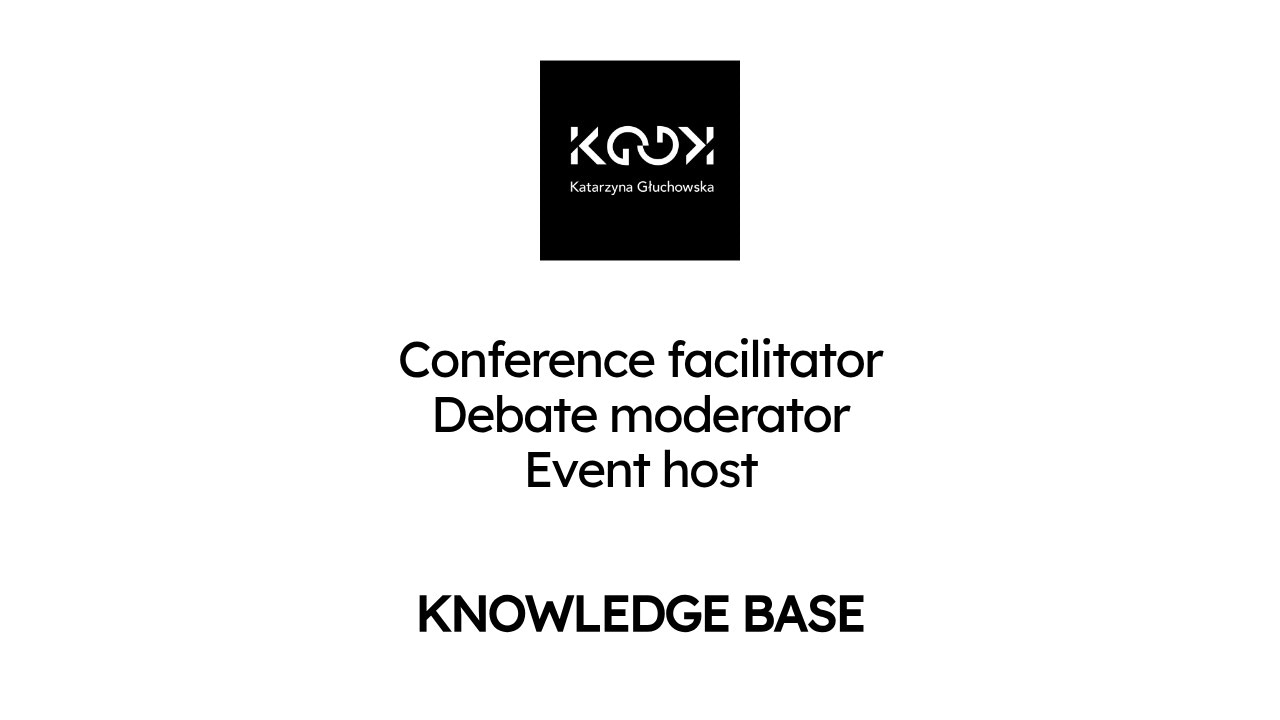Table of contents:
The Role of an Event Host in the Success of International Events
At international gatherings that assemble participants and speakers from a variety of cultures and languages, an event host for international organizations is pivotal to the overall smoothness and professionalism of the occasion. The ideal host not only introduces successive speakers or moderates discussions but also ensures that every message is understandable and engaging for all attendees.
The host’s core duties include preparing for the event so thoroughly that their knowledge of the topics discussed is both current and comprehensive. Katarzyna Głuchowska, with her extensive experience on the international stage, exemplifies this expectation perfectly. Her leadership not only elevates the substantive value of an event but also helps build intercultural bridges—an asset of particular importance to organizations such as the EU, NATO or the UN.
Moreover, her skill in real-time conference interpreting and her professional approach to every element of an event—from technical details to maintaining the right pace and atmosphere—guarantee that all key information is communicated accurately and clearly. This, in turn, enhances the overall quality and reception of the event by an international audience.
In short, the role of an event host at international functions is invaluable: thanks to their communication talents and subject-matter expertise, conferences and congresses achieve their primary goal—an effective, fruitful exchange of knowledge and experience among participants from around the world.
Professional Simultaneous and Consecutive Interpreting as a Key to Global Communication
In a world where borders are becoming increasingly blurred, the ability to communicate effectively on the international stage is crucial to the success of many ventures. Professional simultaneous and consecutive interpreting plays a fundamental role in this context. The profession of a conference interpreter demands not only fluency in multiple languages but also the capacity for rapid information processing and adaptability to the dynamic environment of international events.
Simultaneous interpreting—also known as live or real-time interpreting—entails translating speech almost concurrently with the speaker. This exceptionally demanding task requires impeccable language mastery, intense concentration and quick decision-making. Professionals such as Katarzyna Głuchowska, thanks to years of practice, excel in this role, collaborating with international organizations like the UN or NATO. Consecutive interpreting, on the other hand, involves interpreting after a short speech or segment, likewise demanding focus and the ability to convey the speaker’s intent with precision.
The event host for international organizations does far more than interpret. Figures like Ms Głuchowska are also responsible for the smoothness and professionalism of events, including moderating debates and leading discussion panels. With their broad knowledge and experience, they effectively connect worlds that, despite linguistic and cultural differences, pursue common goals.
Conference interpreting is therefore not merely a job but a true art that enables communication and cooperation at the highest international level. Without professional interpreters such as Katarzyna Głuchowska, many vital discussions, business decisions and diplomatic initiatives would simply not be possible. Their role in the global dialogue is, consequently, absolutely indispensable.
Moderating Debates: Techniques and Strategies for Effective Discussion Leadership
Running a balanced and dynamic discussion demands not only a thorough grasp of the topic but above all the skill of debate moderation. A professional event host for international organizations must demonstrate not only linguistic fluency but also the ability to manage time, steer the conversation’s flow and maintain a neutral, balanced stance toward the arguments presented.
One of the key techniques of effective moderation is maintaining neutrality. The moderator should skillfully balance different perspectives without introducing personal opinions. It is essential that every participant feels heard and respected, fostering an open and constructive exchange of ideas.
Time management is another critical aspect. The moderator’s task is to ensure the discussion does not stray from the main topic and that all points are covered within the allotted timeframe. Effective moderators often employ tools such as speech-time limits or signals indicating the approaching end of a speaker’s slot.
Equally important is the ability to ask the right questions. A well-phrased question can open the door to a deeper analysis of the topic and stimulate valuable responses. A moderator should prepare a series of questions that spark discussion and promote a deeper understanding of the issues at hand.
Nor can one overlook the importance of appropriately responding to participants’ emotions. Moderating a debate—especially at a high-level international forum—often involves a significant degree of tension. A professional moderator must be able to defuse conflicts while preserving an atmosphere of openness and collaboration.
Applying these techniques and strategies enables not only the effective hosting of events but also the creation of an atmosphere of comprehensive understanding and respect—core principles in the work of any event host for international organizations.
Find out more – Click here: https://katarzynagluchowska.pl/en/
